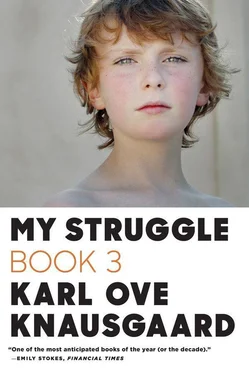And then there was the tree on the slope by the boggy land. I didn’t know what species it was. It wasn’t compact like the other large trees but grew out from four equally proportioned trunks, they wound outward, serpent-like, with grayish-green bark full of extended hollows, and in this way it covered just as large an area as an oak or a spruce, but the effect was not as magnificent, it was more subtle. From one of the branches hung a rope and a wooden bar, probably put there by the boys living on the road opposite, they lived as close to this place as we did. No one was there now, and I went up the slope under the branches, grabbed the bar with both hands, and launched myself. I did it twice more. Then I stood for a while under the tree wondering what to do next. From the house facing the slope, occupied by a couple with a small child, came the sound of voices and the clinking of cutlery. I couldn’t see anything, but guessed they had to be in the garden. Somewhere in the distance there was the drone of a plane. I took a few steps into the dried-up bog, peering at the sky. A small seaplane was approaching from the coast, flying very low, the sun gleaming on the white fuselage. Once it had gone behind the ridge I broke into a run again, into the shadow of the hill on the other side, where the air was a touch cooler. I looked up at Kanestrøm’s house, thinking they were probably at the table eating mackerel at this very minute, there was no one outside at any rate, and then I looked down to the path, where I knew every stone, every dip, every tuft, and every mound. If a run had been arranged here, from our house along the path to B-Max, I would have been invincible. I could have run along that path with my eyes shut. Without ever needing to stop, always knowing what was waiting around the next bend, always knowing where it was best to tread. When we raced on the road Leif Tore won every time, but I would win here, of that I had no doubt. It was a good thought, a good feeling, and I tried to hold on to it for as long as possible.
Well before I reached the soccer field I heard the voices coming from it, screams and shouts and laughter, as if from a distance, as if heard through the forest, there was something almost apelike about it. I stopped in the clearing. The field before me was swarming with children of all ages, many of whom I had barely seen before, most crowded around the ball, with everyone trying to kick it away, the hubbub drifting from place to place, backward and forward, in fits and starts. The field was dark, trampled ground in the middle of the forest, and it sloped slightly up on one side, where quite a number of roots broke through the surface. At each end there was a big goal made with wooden beams, without a net. One side was considerably truncated by protruding rock while the other extended across an uneven patch of large tufts of stiff grass. Almost all my dreams originated here. Running around in this place was bliss.
“Can I join in?” I shouted.
Every kick of the ball returned in a dull echo off the hillside.
Rolf, who was in goal, turned to me.
“You can be goalie if you like,” he said.
“OK,” I said, running toward the goal, which Rolf left with a slow, rolling gait.
“Karl Ove’s in goal for us!” he shouted.
I positioned myself carefully between the posts and started to follow the game, gradually distinguishing who was in my team, leaned forward, and was ready when the ball approached, and when the first shot came, a loose ball along the ground, I crouched down and took it, bounced it three times on the ground and booted it up the field. The ball gave against my foot, it was big and soft and worn, the same color as the sun-baked ground. The orange tongue flashed beneath the stitching. The ball’s trajectory wasn’t high, but it went a long way nevertheless, bounced on the right-hand side of the field, and it was a joy to see the pack of boys running after it. I wanted to be a goalkeeper. I went into goal as often as I could, nothing could compare with the feeling of hurling yourself at a shot and stopping it. The problem was that I could only hurl myself to one side, the left. Hurling myself to the right appeared to be contrary to the laws of nature, I couldn’t do it, so if the ball came on that side I had to stick out my leg instead.
The trees cast long shadows across the field, and flickering patches of murk pursued the running boys, who merged into a mass and dispersed again and again. But some boys had started walking instead of running, some were bent over, supporting themselves on their knees, and to my disappointment I realized the game was coming to an end.
“Well, I’d better be getting home,” one said.
“Me, too,” a second said.
“Let’s keep going for a bit,” a third said.
“I’ve got to be off, too.”
“Shall we make new teams then?”
“I’m off.”
“Me, too.”
Within a couple of minutes the whole scene had evaporated, and the field was empty.
The wrapping paper Mom had bought was blue and semitransparent. We sat in the kitchen, I unrolled a piece and cut it to size; if the edge was uneven and jagged Mom straightened it. Then I placed the book on top, spread out the two wing-like flaps, folded the paper over them, and taped down the corners. Mom adjusted what needed to be adjusted along the way. Otherwise she sat knitting a sweater that was meant for me. I had chosen it from one of her pattern magazines, a white sweater with dark brown edges, it was different, because the collar was high and straight and there was a split on each side at the bottom so that it hung a bit like a loincloth. I really liked the Indian style and kept a weather eye on how far she had got with it.
Mom did a lot of needlework. She had crocheted the curtains in the living room and the kitchen, and she had sewn the white curtains in our bedrooms, Yngve’s with a brown hem and brown floral print, mine with a red hem and a red floral print. In addition, she knitted sweaters and woolly hats, darned socks, patched trousers and jackets. When she wasn’t doing that, or cooking and washing up, or baking bread, she read. We had whole shelves full of books, something none of the other parents had. She also had friends, unlike Dad, mostly women of the same age at her workplace, whom she visited now and then, if they didn’t come here, that is. I liked all of them. There was Dagny, whose son and daughter, Tor and Liv, I went to kindergarten with. There was Anne Mai, who was fat and happy and always brought us some chocolate, she drove a Citroën and lived in Grimstad, where I had visited her once with the kindergarten. And there was Marit, who had a son, Lars, the same age as Yngve, and a daughter, Marianne, who was two years younger. They didn’t come here often, Dad didn’t like it, but perhaps once a month one or more of them came; then I was allowed to sit with them for a while and bask in the radiance. And occasionally in the evening we went to the arts and crafts workshop in Kokkeplassen, it was the kind of place where you could do all sorts of things, the children of other employees at my mothers workplace went there, too, and that was where we used to make our Christmas presents.
Mom’s face was gentle but serious. She had tucked her long hair behind her ears.
“Dag Lothar saw an adder today!” I said.
“Oh?” she said. “Where was that then?”
“On the path to the Rock. He almost stepped right on it! Fortunately, though, it was just as frightened as he was and slithered off into the bushes.”
“Lucky for him,” she said.
“Were there adders when you were growing up?”
She shook her head.
“There aren’t any adders in Vestland.”
“Why not?”
She chuckled.
“I don’t know. Perhaps it’s too cold for them?”
Читать дальше












